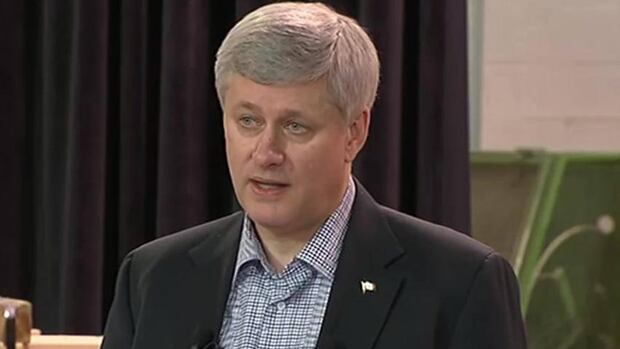Stephen Harper says falling oil prices won't throw government off course
PM announces financing help for small businesses
Prime Minister Stephen Harper says falling oil prices may force the government to make some adjustments, but won't change its course over the long term.
"We live in a world of volatility and these things are creating some shocks that will impact us, but they're not going to throw us off our fundamental growth path," Harper said in St. Catharines, Ont., on Thursday.
- Analysis: Stephen Harper hopes to paint Toronto blue in next election
- Analysis: Federal budget 2015: Economists making it difficult for Joe Oliver
Harper's comments come a day after the Bank of Canada cut its interest rate by a quarter of a percentage point and revised growth projections, citing the harm from falling oil prices on the Canadian economy.
The central bank cut its forecast for economic growth for 2015, but projects more growth in 2016 assuming oil prices average $60 US a barrel over the next two years.
Asked whether further stimulus was needed in light of the Bank of Canada's cut to its overnight lending rate, Harper said "no."
"In terms of fiscal policy, the appropriate action is to make sure that as long as the Canadian economy continues to grow, we balance our budget."
Harper acknowledged the drop in oil prices will cause "some pain" and have a "significant" impact on the government's finances and the overall economy, but said the country's fortunes do not rest solely on the energy sector.
"The oil industry isn't remotely the entire Canadian economy. There are many benefits to other parts of the economy because of these developments."
Federal Liberal Party Leader Justin Trudeau accused Harper this week of putting all his eggs in one basket and relying too heavily on oil prices remaining high.
Harper said he was confident the oil industry would bounce back and emerge "very strong for the long term."
$3B contingency fund
Both the Opposition New Democrats and the Liberals accused the Conservatives of not having a backup plan after the government decided to delay its spring budget until at least April in the face of plunging oil prices and market volatility.
The decision to delay the budget came after TD Economics updated its forecast to project a $2.3-billion deficit in 2015-16, rather than the $1.6-billion surplus the government had projected for 2015-16.
The TD report also noted the government could tap into its $3-billion a year contingency fund to post a slim surplus.
Asked whether the government would use its contingency fund to balance the books or deliver on promised tax measures, Harper did not explicitly rule it out, but said the fund was there for "unforeseen circumstances."
Oliver also would not say today if the government would dip into its contingency fund to offset the loss of federal revenues from oil, but acknowledged his "flexibility" has decreased in an interview with The Canadian Press from the World Economic Forum in Davos.
However, MP Andrew Saxton, who is Oliver's parliamentary secretary, said Tuesday on CBC News Network's Power & Politics that the "unforeseen" drop in oil prices is a reason to dip into the contingency fund.
"The contingency fund is there for contingencies, contingencies are unforeseen circumstances, lower oil prices were an unforeseen circumstance," Saxton said when asked about the fund.
Employment Minister Jason Kenney told CBC Radio's The House last weekend that the fund was for "unforeseen circumstances" and suggested in other media interviews the government would rather freeze or cut spending rather than dip into the fund.
Harper said the government would continue with its plan to help small and medium businesses grow and keep taxes low.
"This is the formula that has made the Canadian economy one of the most stable and solid in the world, it's the formula that has given us two million net new jobs in a time of incredible volatility."
More money for small businesses
Harper was in southern Ontario to announce a new program to make it a little easier for small businesses to access certain financing.
Most companies with gross annual revenue of $10 million or less — up from $5 million — will now be eligible under the Canada small business financing program. They can borrow up to $500,000 each.
The changes will allow more small businesses to borrow money to buy or improve land or buildings.
Harper said the program, which aims to help new businesses get started and existing ones to grow, will help create jobs.
With files from The Canadian Press
